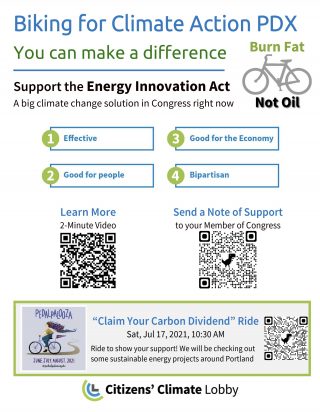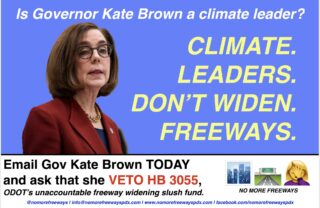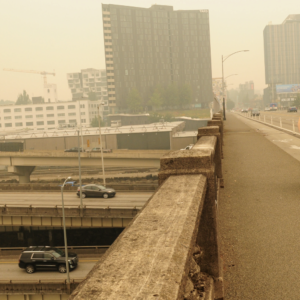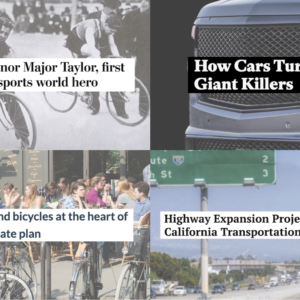
The recent heat wave, looming wildfire risks, and lawmakers’ tone deaf support of freeway expansions are fueling high anxiety about climate change in the Portland region. And as you might expect, many people are organizing and taking action to do something about it.
There’s now a “Bike Action Team” that has formed under the local chapter of the Citizens’ Climate Lobby, a nationwide effort to boost awareness and support for the federal Energy Innovation and Carbon Dividend Act. The legislation would put a price on carbon and send taxpayers a carbon dividend check. We first reported about local support for this effort back in March. Since then, six more local bike shops have signed onto the Business Climate Leaders Bicycle Industry Climate Declaration. Backpedal Cycleworks, Block Bikes PDX, Gladys Bikes, Joe Bike, Kenton Cycle Repair, and New Age Bike Works are the six new shops on the list. They join Clever Cycles, Cyclepath, Cynergy E-Bikes, The eBike Store, Inc., Fat Tire Farm, Go By Bike, Nomad Cycles, Recumbent PDX, River City Bicycles, Rose City Recumbent Cycles and West End Bikes.
You’ll likely see this poster (right) at these shops next time you stop in. The poster has QR codes where you can learn about the legislation and send your congressional representative a note to urge their support.
Advertisement

If you’d like to take action and get plugged into this effort, there’s a Pedalpalooza ride scheduled for Saturday, July 17th. The Claim Your Carbon Dividend Ride will be led by an organizer from the Citizens’ Climate Lobby Bike Action Team and will check out sustainable energy projects around Portland and write postcards to lawmakers at the end spot (Asylum Food Carts).
Learn more at the Bike Action Team website. If you’d like to get involved, contact Citizens Climate Lobby volunteer and Portland Chapter Co-leader Francine Chinitz at fchinitz[at]hotmail.com
Meanwhile, local nonprofit No More Freeways has stepped up its fight against a bill recently passed by the Oregon Legislature that will increase funding for freeway expansion projects favored by the Oregon Department of Transportation. HB 3055 will allow ODOT to move forward with several freeway projects by bonding against future tolling revenue and increasing the state’s debt limit. No More Freeways wants Governor Kate Brown to veto the bill and has collected hundreds of emails and postcards from Oregonians who understand that wider freeways will increase greenhouse gas emissions.
“This is an opportunity to push Governor Brown to channel [former Oregon] Governor [Tom] McCall and leave a similar legacy – that Oregon will take immediate action to stop the freeway industrial complex and be a national leader in decarbonizing our transportation system,” the group wrote in a recent action alert email.
— Jonathan Maus: (503) 706-8804, @jonathan_maus on Twitter and jonathan@bikeportland.org
— Get our headlines delivered to your inbox.
— Support this independent community media outlet with a one-time contribution or monthly subscription.







Thanks for reading.
BikePortland has served this community with independent community journalism since 2005. We rely on subscriptions from readers like you to survive. Your financial support is vital in keeping this valuable resource alive and well.
Please subscribe today to strengthen and expand our work.
Canada, which has a highly-advanced economy and a large oil and gas economic sector similar to the US, has carbon pricing:
https://www.theglobeandmail.com/canada/article-canada-carbon-tax-explained/
And British Columbia, our closest Canadian neighbor, with a population and road network similar to Oregon, also has carbon pricing:
https://www2.gov.bc.ca/gov/content/environment/climate-change/clean-economy/carbon-tax
Stopping all highways should be a bare minimum. If we really want to make any progress we need a program of reducing miles of highways. We should have a monthly quota of highways to grind down to bikeways.
Problem is, even if we go full-out EV, we still need freeways to drive ’em on. Mother Nature is calling the shots now, and she isn’t selective or forgiving. Then there’s that comment from Exxon Mobil that essentially said, of course we’re for greenhouse gas emission reduction because we know it won’t happen.
IMO, the quickest way Oregon can disincentivize the construction of new highways is to repeal the statewide requirement that gas taxes and other related revenue for all cities, counties, and ODOT must be used for transportation-related projects – and instead move that revenue into the general fund for housing, schools, and whatnot.
relatedly, reducing ODOT’s share from 50% to 25% or less wouldn’t hurt
Climate Change is so far along, and we are approaching a number of tipping points (positive feedback loops) that we must bring a much greater sense of urgency to this battle. Converting transportation to cycling is one of the simplest, purest and least energy controversial of anything we can do. But if we are really serious, and want to have any hope of saving our Children and Grandchildren from a future of 116 degree weekends we must to the following within 5 years. End the use of private automobiles (including EV’s). End commercial, private and freight air travel. End all deforestation, and put an Apollo like effort in to replanting any area with the ability to grow trees, even if that means removing human infrastructure such as vacation dwellings in the way. End the production of all mass produced plastic items from toys, to drink bottles to lawn furniture. All water heating in the proper climates must be converted to Solar. Tax laws must be put in place to make it financially impossible for any family or person to own more than one dwelling (unless is it rented and occupied). Is it possible for us to wrap our mind around what has to be done and change our ways? Probably not, and people will have a million reasons why not. But in the end, such excuses are just denial. We are like the passengers on the Titanic after hitting the iceberg except we are burning the lifeboats to roast hotdogs and make Smores cause “we deserve it.”
Don’t forget population control.
Well, if we are “lucky,” climate change will take care of that for us.
Nature is starting to deal with population control. Both birth and life expectancy rates are falling. Then there’s the anti-vaxxers, most of whom will be dead by this time next year as the Delta variant kicks in.
haha, the economy is taking care of both of those. I am pretty sure nature doesn’t create fentanyl or insane child care costs.
Putting a price on carbon will accelerate solar power, biking, energy efficiency and all types of innovations. This is the single most impactful solution we can implement to address climate change. We can reduce carbon emissions by 50% by 2030 by passing the Energy Innovation and Carbon Dividend Act. Will we still need to work on more problems like deforestation and eliminating plastics? Yes! But this legislation will buy us more time to work on these issues. Climate change is a threat multiplier and demand immediate action.
Carbon pricing is to the climate crisis what banning plastic straws is to oceanic pollution.
IPCC consensus modeling unambiguously illustrates that carbon pricing would only be effective over the medium-term at levels ($500+/ton) that would result in de facto mandates so the question is why would anyone support carbon pricing instead of mandating emission reductions?
See Fig 2.26 IPCC AR5:
https://www.ipcc.ch/site/assets/uploads/sites/2/2019/06/SR15_Full_Report_Low_Res.pdf
In my opinion, those who advocate for carbon pricing are basically functioning as unwitting stooges for GHG-polluting industries who see “carbon pricing” as a key green washing strategy to avoid mandates (e.g. actually lowering emissions).
In addition to ignoring the climate science consensus on pricing, proponents of carbon pricing also tend to ignore mounting evidence that carbon pricing simply does not work in the context of our “captured” economic system:
https://iopscience.iop.org/article/10.1088/1748-9326/abdae9/meta
“Overall, the evidence indicates that carbon pricing has a limited impact on emissions.”
https://www.pnas.org/content/117/16/8664
More on the failures of carbon pricing schemes:
http://bostonreview.net/science-nature-politics/matto-mildenberger-leah-c-stokes-trouble-carbon-pricing
Carbon pricing has not been adequately studied, as the Green piece states, to conclude definitively that carbon pricing is or is not the best strategy. There is no “climate science consensus” on pricing. The California system is ineffective because of (intentionally?) bad design. It is the US, after all. But assuming it is “effective over the medium-term”, as you say, then it’s a whole lot better than the status quo. And it is not incompatible with advocating for mandating emissions reductions, as you seem to imply.
You talk about carbon pricing advocates as “stooges,” but people advocating for the government to mandate drastic, immediate lifestyle changes for Americans as the solution are so unrealistic, and so easily pilloried by the political establishment, that they help ensure that the status quo prevails. So my opinion is that perhaps you are the real stooge.
Nonsense. The scientific consensus in Figure 2.26 of the IPCC AR5 shows that pricing would only be effective over the medium-term (e.g. keeping warming markedly below 2 C) at punishingly high prices. FWIW, I have no problem with draconian carbon pricing that essentially function as a mandate but this is not even in the Overton window of “climate advocates” in the USA so I’m not holding my breath.
Dr. Green’s peer-reviewed publication is an ex-post facto analysis of extant climate pricing schemes and shows that even European ETS has been a resounding failure.
“…37 studies assess the actual effects of the policy on emissions reductions, and the vast majority of these are focused on Europe. Second, the majority of studies suggest that the aggregate reductions from carbon pricing on emissions are limited—generally between 0% and 2% per year.”
The failure of pricing in Europe is non-controversial. Even neoliberal proponents of ETS admit that it has only reduced emissions by a miniscule amount (2-4%) versus an EU without the ETS (you can google the many Billionaireberg pieces that trumpet a multi-decade ~3% reduction).
https://www.cei.org/wp-content/uploads/2011/12/matt-sinclairs-ets-study-oct-09.pdf
https://ec.europa.eu/clima/sites/clima/files/docs/0005/registered/9825553393-31_friends_of_the_earth_europe_en.pdf
We are living with the consequences of the deeply-embedded cultural narcissism that led so many ‘murricans to be hostile to pandemic restrictions. I hope that USAnian society develops enough empathy for the human beings most impacted by the climate crisis to make a few modest sacrifices but I would not be surprised if it’s just consumption/business as usual in coming decades.
Well said. It now seems clear that the pandemic has not significantly disrupted business as usual. What will it take?
FWIW, the EU and China are increasingly getting it. It’s the USA that is the global pariah when it comes to addressing ongoing ecocide.
Thank you for your interest/concern about climate change.
There is no single solution to climate change. We need many solutions and mitigation programs. CCL proposes that that carbon pricing should be one of those solution.
I looked at your IPPC link, but did not see the $500/ton criteria.
On page 33 of this IPCC report, it says, “Policies reflecting a high price on emissions are necessary in modelecs to achieve cost-effective 1.5°C pathways (high confidence).”
https://www.ipcc.ch/site/assets/uploads/sites/2/2018/12/SR15_TS_High_Res.pdf
The Energy Innovation and Carbon Dividend Act would start at $15/ton, and then increase every year until emission targets are met. In 10 years, it would be $100/ton. If target is not being met, the price will increase each year at a higher rate.
Over 3,500 economists, including 28 Nobel Laureate, endorse carbon fee and dividend as an effective way to reduce carbon emissions.
https://www.clcouncil.org/economists-statement/
The Center on Global Energy Policy (CGEP) at Columbia University’s School of International and Public Affairs conducted a study in 2019 and concluded that GHG emissions would decline substantially. Compared to 2005 levels, implementing EICDA as a stand-alone policy leads to economy-wide net GHG emissions reductions of 32–33 percent by 2025 and 36–38 percent by 2030.
https://www.energypolicy.columbia.edu/research/report/assessment-energy-innovation-and-carbon-dividend-act
We can agree that we both want to curb emissions quickly and effectively. I’m curious – what specific policies you would like to see implemented to achieve this goal?
Given my “stooges” comment I probably deserve this but I first became deeply concerned about the climate crisis as a chemistry student in the early 80s. I watched in amazement as I entered a PhD program that our societies continued to do absolutely absolute nothing to address this looming civilizational crisis. I went through the Kubler-Ross cycle of anger, depression, and acceptance in the late 80s and 90s so I’m somewhat removed from mere concern/interest at this point. (FWIW, For the first time in decades I am now somewhat optimistic that high end sensitivity looks to have narrowed to 3-3.5 C thanks to better modeling).
I literally pointed you to the figure that gives a consensus summary of the literature (meta-analysis) on pricing levels needed to keep heating well-below 2 C (1.5ish).
Here is a direct link: https://www.ipcc.ch/sr15/chapter/chapter-2/2-5/2-5-2/2-5-2-1/figure-2-26/
And since you may not find my interpretation as a scientist who has been doom-reading the climate science literature for 40 years here is how the NYTs describes this work:
https://www.nytimes.com/2018/10/08/climate/carbon-tax-united-nations-report-nordhaus.html
With all due respect, I find this question to be intensely annoying because UN consensus reports have been spelling out what we must do in great detail for decades.
As for the politics of how we implement the model-based mitigation pathways described in excruciating detail in AR5, SR1.5, and the draft AR6 I very much agree with this recent publication in Nature Climate Change:
The evidence is clear. Long-term and concurrent human and planetary wellbeing will not be achieved in the Anthropocene if affluent overconsumption continues, spurred by economic systems that exploit nature and humans. We find that, to a large extent, the affluent lifestyles of the world’s rich determine and drive global environmental and social impact. Moreover, international trade mechanisms allow the rich world to displace its impact to the global poor. Not only can a sufficient decoupling of environmental and detrimental social impacts from economic growth not be achieved by technological innovation alone, but also the profit-driven mechanism of prevailing economic systems prevents the necessary reduction of impacts and resource utilisation per se.
The USA is on the very edge of that orange zone and must rapidly move into the light green area.
https://www.nature.com/articles/s41467-020-16941-y
Correction: Nature Communications not Nature Climate Change